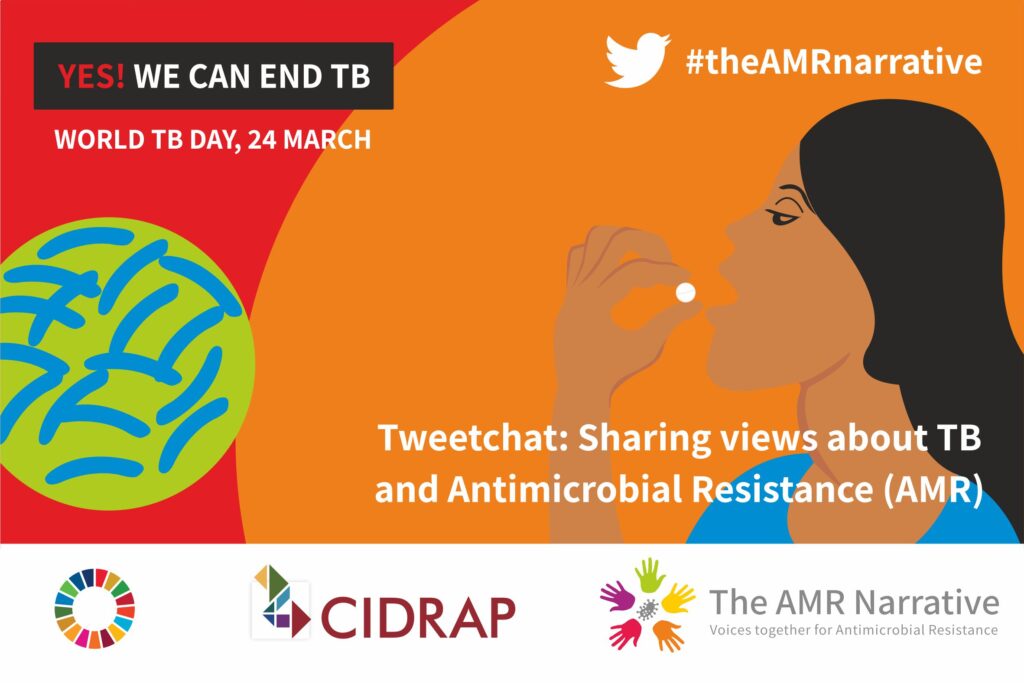Tweetchat: Sharing views about TB and AMR
Tweetchat: Sharing views about TB and AMR
Info

In partnership with the Center for Infectious Disease Research and Policy – Antimicrobial Stewardship (CIDRAP-ASP) we invite you to join us on the 24th of March 2023 to discuss the impact of Antimicrobial Resistance on TB.
- Moderator: Francesca Chiara (@CIDRAP) & Vanessa Carter (@theAMRnarrative)
- Date: 24 March 2023
- Time: 4 pm – 5 pm GMT
- Hashtag: #theAMRnarrative
Summary
According to the Global Tuberculosis Report 2022, an estimated 10 million people fell ill with tuberculosis (TB) worldwide in 2021 and 1.6 million people died from TB. TB is one of the top 10 causes of death and the leading cause of death from a single infectious agent, worldwide.
TB is caused by the bacterium Mycobacterium tuberculosis and is a life-threatening illness if not treated properly. Antimicrobial medicines are essential to the treatment of tuberculosis (TB).
Common antimicrobial treatments for TB are known as first-line drugs, which include isoniazid, rifampin, pyrazinamide, and ethambutol. These medications are typically administered for a period of six to nine months, and the exact combination and duration of treatment depends on the individual patient.
Despite the rate of infections dropping and treatment success rate increasing over the past few years, cases of drug-resistant TB (DR-TB), including resistance to rifampim or isoniazid or to several drugs, are on the rise. Multidrug-resistant (MDR) and extensively drug-resistant (XDR) TB are more difficult to treat, require lengthy and costly treatment, and can expose people with TB to severe and life-threatening side effects. It is thought that at least 20% of people with MDR TB die every year despite receiving treatment.
When a person has a form of drug-resistant TB (MDR-TB / XDR-TB), second-line drugs such as fluoroquinolones may be used.
It is crucial for people with TB to have access to high-quality medications and complete their entire course of anti-TB treatment to ensure that the TB bacteria are completely eradicated. Inadequate TB treatment, lack of adherence and failure to complete TB treatment, and the use of poor quality TB drugs is contributing to the development and spread of drug-resistant TB. Additionally, proper infection control measures such as covering the mouth and nose when coughing, and proper ventilation of living spaces, can also help prevent the spread of TB.
Given the interconnectedness of these global issues, AMR and TB strategies should work alongside them.
In particular, recognising the role that people with TB can play in raising AMR awareness.
We would like to thank TB Proof for their support in designing this event.
.png)
Questions:
T1: What is AMR and why is it a problem in people affected by Tuberculosis?
T2: Why are people with TB so badly affected by AMR infections?
T3: How might we reduce the incidence of infection/improve treatment options for people with TB with consideration to AMR?
T4: What is antimicrobial stewardship and how can it support patients with TB?
T5: Effective treatments are key. How can we overcome challenges to the affordability and availability of high-quality TB drugs?
CT: Any thoughts you would like to add about the impact of AMR and TB?
How to participate:
Join us for a 60-minute Twitter chat with our panel experts. All stakeholders are welcome.
Start your answers with T1, T2, T3, T4, T5 or CT for transcript purposes.
Answer only after the moderator prompts. Questions will be prompted every 10 minutes but keep answers coming using the relevant T and number. Both panel experts and the public are encouraged to answer.
Use the #theAMRnarrative hashtag in all your tweets so that you are visible to others in the chat and captured on the transcript.
More can be read about this event at the CIDRAP website here.
Notes: Prior to the event, review the University of Minnesota’s Social Media House Rules for a code of conduct applicable to this event.
